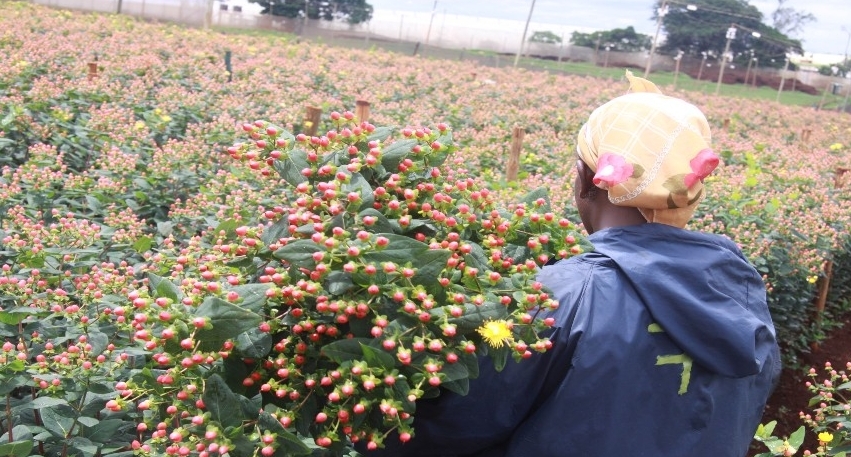Kenyan flower exporters intend to diversify markets, logistics
With the challenges of the Covid-19 pandemic and the trade disruption still exist, Kenyan cut flowers growers and exporters’ business membership organisation, Kenya Flower Council is pushing hard to move the flowers through sea freight.

With the onset of the Covid-19 pandemic, Kenyan cut flower export and logistics is changing forever. The challenges posed by the pandemic have encouraged growers and exporters to rewire their business by diversifying both the transport modes as well as target markets.
With the challenges of the Covid-19 pandemic and the trade disruption still exist, Kenyan cut flowers growers and exporters’ business membership organisation, Kenya Flower Council (KFC) is pushing hard to move the flowers through sea freight. Flowers from Kenya are traditionally been transported around the world majorly by air, using both cargo planes and passenger aircraft’s belly, due to their perishable nature.
Clement Tulezi, chief executive officer of Kenya Flower Council informed that trials are ongoing supported by growers, exporters and development partners on sea freight with encouraging outcomes. “We believe this is crucial in filling the gap occasioned by constrained air capacity, higher freight costs and minimized carbon emissions,” he said.
Transport of flowers from Kenya to the destination markets was severely affected at the onset of Covid-19 in the year 2020 which saw all passenger planes grounded for several months. “Our exports fell to about 25 percent in April 2020 with a deficit of about 2,000 tonnes per week,” he said.
Our exports fell to about 25 percent in April 2020 with a deficit of about 2,000 tonnes per week.
Clement Tulezi, Kenya Flower Council
The pandemic led to high freight costs as airlines opted to transport Covid-19 related equipment such as vaccines and medical equipment rather than horticulture produce. Most of the major freighters also opted to concentrate on more lucrative routes as the skies gradually began opening up. Tulezi said, “Through negotiations by KFC, airlines like Kenya Airways changed their passenger planes into cargo planes. The situation has greatly improved, but we are still short of about 500 tonnes per week.”
Kenya exported cut flowers of $993 million in 2020 compared to $951 million in 2019, according to the Fresh Produce Exporters Association of Kenya. While, as per the data provided by Statista, the cut flowers export volume from Kenya was 146.1 thousand metric tonnes in 2020 compared to 173.7 thousand metric tonnes in 2019.
Higher revenues despite lower volume were the result of higher average prices for flowers in the international market caused by the reduced supply. However, the industry's profit margins remained low due to the Covid-19 pandemic related challenges.
Kenya's climatic conditions and geographic location allow flowers to be grown all year round. All flowers are grown under natural conditions, with about 3,800 hectares indoors and 1,000 hectares in open fields. Most of these flowers are particularly in high demand and exported during Valentine's Day and Mother’s Day every year.
Kenya sells her flowers to over 60 destinations globally. “The most important export destination for Kenya's flowers is the European Union where she commands about 40 percent of all the flowers sold. Kenya is also the number one exporter of flowers in Japan and sells substantial amounts to Australia, Russia and the Middle East,” Tulezi noted. However, the flower industry of Kenya intends to diversify its markets to other destinations like the US, the Far East and Eastern Europe.
He also informed that the major challenge in this business is coordination and sharing of information across the supply chain for proper decision-making.
KFC interacts with many stakeholders in the supply chain with main targets as growers/exporters (KFC members), buyers and regulators in the market. “Exporters are constantly faced with the challenge of new sanitary and phytosanitary requirements in the market, ever-changing quality preferences, tariffs and non-tariff barriers,” he said. This is why KFC works closely with regulators such as the Horticulture Crops Directorate (HCD), the Pest Control Products Board (PCPB) and the Kenya Plant Health Inspectorate Service (KEPHIS).
“Also, with ministries, departments and agencies such as the ministry of agriculture, the ministry of industrialisation, trade and enterprise development, the ministry of finance, the ministry of foreign affairs, the Kenya Bureau of Standards, Kenya Airports Authority etc. And at the lower level, we are engaged with the county governments directly and also through the council of governors,” Tulezi said.
“Additionally, KFC has also a good working relationship with most foreign missions in Kenya, airlines, freight forwarders, supplier of inputs, technological companies, financial institutions and other institutions involved in the supply chain. And we interact a lot with the business membership organizations such as the Kenya Private Sector Alliance, the Kenya Association of Manufacturers, the Agricultural Employers Association and associations in the horticulture sub-sector,” he added.
KFC is actively engaged in all major trade negotiations in existing, new and emerging markets and in amplifying Kenya’s image in the international market as the most trusted source of cut flowers and ornamentals.
Clement Tulezi, Kenya Flower Council
The council claims that KFC members account for approximately 80 percent of Kenya’s floricultural exports and it is at the forefront of promoting Kenya as a reliable source of quality cut flowers and ornamentals and the country’s competitiveness in the global floriculture trade. KFC engages with key actors locally for a favourable business environment for growers and exporters of cut flowers and ornamentals. Tulezi said, “KFC is actively engaged in all major trade negotiations in existing, new and emerging markets and in amplifying Kenya’s image in the international market as the most trusted source of cut flowers and ornamentals. We are in touch with buyers and trading partners in the markets with a clear message on our resilience and assurance of steady supply of cut-flowers and ornamentals during these difficult times.”
The future of flower logistics is bright given that Kenya is a top-four supplier of cut flowers and ornamentals in the world and boasts of some of the best cold chain facilities in the world. Kenya is a communication hub for East and Southern Africa thanks to its geographical location and advanced infrastructure. Kenya has signed and ratified the Africa Continental Free Trade Area (ACFTA). She is also a member of the Common Market for Eastern and Southern Africa (COMESA) and the East African Community (EAC).
“For these trading blocs to achieve their desired goals, logistics will play a pivotal role. KFC is a key partner with the Kenyan government in discussions on opening up more intra-Africa markets and create a conducive business environment within and among African trading blocs. We see huge potential trading cut flowers and ornamentals within these blocs,” he concluded.


